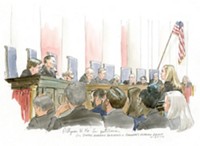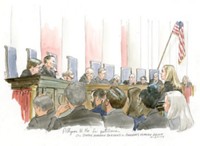Advertisement
Grab your lab coat. Let's get started
Welcome!
Welcome!
Create an account below to get 6 C&EN articles per month, receive newsletters and more - all free.
It seems this is your first time logging in online. Please enter the following information to continue.
As an ACS member you automatically get access to this site. All we need is few more details to create your reading experience.
Not you? Sign in with a different account.
Not you? Sign in with a different account.
ERROR 1
ERROR 1
ERROR 2
ERROR 2
ERROR 2
ERROR 2
ERROR 2
Password and Confirm password must match.
If you have an ACS member number, please enter it here so we can link this account to your membership. (optional)
ERROR 2
ACS values your privacy. By submitting your information, you are gaining access to C&EN and subscribing to our weekly newsletter. We use the information you provide to make your reading experience better, and we will never sell your data to third party members.
Policy
Process for resolving U.S. patent disputes stays
Supreme Court upholds system that helps generic drugmakers challenge patents
by Glenn Hess, special to C&EN
June 24, 2016
| A version of this story appeared in
Volume 94, Issue 26
The U.S. Supreme Court last week delivered a win to generic drug manufacturers in patent fights with pharmaceutical and biotechnology companies. In an 8-0 decision, the justices upheld a lower court ruling that makes it easier for challengers to invalidate patents without engaging in costly and lengthy lawsuits.
The case (Cuozzo v. Lee) focused on a system used by an appeals board at the U.S. Patent & Trademark Office to settle disputes over patent validity. Congress created the system in 2011 as a way to resolve patent challenges far more cheaply and quickly than in a federal court.
Since then, the board has canceled hundreds of patents and has been dubbed a “death squad” by critics. The board uses a broad legal standard to interpret patent claims, which makes it easier to discover information that could show a patent does not cover anything new.
Brand-name drug makers, who depend on strong patent protection to attract investment for R&D, are opposed to the current system. They argue that the appeals board should use the same narrow standard as federal courts do when it comes to interpreting patent claims.
The Pharmaceutical Research & Manufacturers of America, the brand-name drug industry’s trade group, warned justices in a brief that the standard adopted by the appeals board “breeds uncertainty and stifles innovation” in American medicine.
But the Supreme Court ruled that the USPTO was within its legal authority when it adopted a broader standard than federal courts for interpreting patent claims.
The generic drug industry supports the current system, saying it is a cost-effective way to weed out dubious patents that make weak claims to new inventions. The process allows more lower-priced drugs to get into the hands of patients sooner, the Generic Pharmaceutical Association (GPhA) told the justices in a brief.
GPhA welcomed the ruling, saying “the Court recognizes the vital need for an efficient patent review process—one that promotes a competitive, affordable prescription drug market for consumers.”





Join the conversation
Contact the reporter
Submit a Letter to the Editor for publication
Engage with us on Twitter